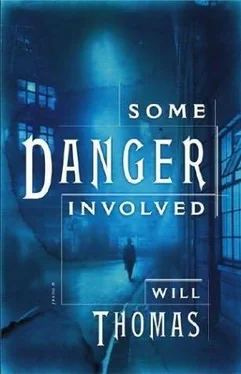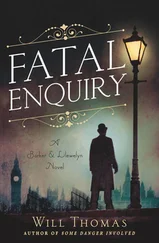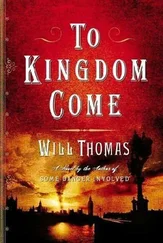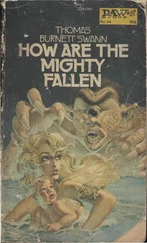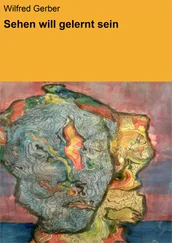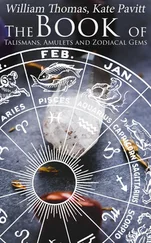Will Thomas - Some Danger Involved
Здесь есть возможность читать онлайн «Will Thomas - Some Danger Involved» весь текст электронной книги совершенно бесплатно (целиком полную версию без сокращений). В некоторых случаях можно слушать аудио, скачать через торрент в формате fb2 и присутствует краткое содержание. Жанр: Исторический детектив, на английском языке. Описание произведения, (предисловие) а так же отзывы посетителей доступны на портале библиотеки ЛибКат.
- Название:Some Danger Involved
- Автор:
- Жанр:
- Год:неизвестен
- ISBN:нет данных
- Рейтинг книги:4 / 5. Голосов: 1
-
Избранное:Добавить в избранное
- Отзывы:
-
Ваша оценка:
- 80
- 1
- 2
- 3
- 4
- 5
Some Danger Involved: краткое содержание, описание и аннотация
Предлагаем к чтению аннотацию, описание, краткое содержание или предисловие (зависит от того, что написал сам автор книги «Some Danger Involved»). Если вы не нашли необходимую информацию о книге — напишите в комментариях, мы постараемся отыскать её.
Some Danger Involved — читать онлайн бесплатно полную книгу (весь текст) целиком
Ниже представлен текст книги, разбитый по страницам. Система сохранения места последней прочитанной страницы, позволяет с удобством читать онлайн бесплатно книгу «Some Danger Involved», без необходимости каждый раз заново искать на чём Вы остановились. Поставьте закладку, и сможете в любой момент перейти на страницу, на которой закончили чтение.
Интервал:
Закладка:
"Perhaps," Barker conceded. "Most constables are conscientious, but a case like this could involve more than they're willing to pursue. Did they escort you back to Bevis Marks or take you to a police station?"
"Neither. They simply let me go. I took an afternoon train back to Aldgate, stopped off at a wine house in Cornhill to steady my nerves with a glass of sherry, and came back here. Everyone was upset, of course, and the Chief Rabbi insisted that I go to a physician. My head was all right despite the clout. The doctor says I am thickheaded! But I may have cracked a rib."
"Did you happen to notice if you were followed?"
The caretaker turned pale all of a sudden and clutched his ruddy curls. "No. I didn't look. Do you think I may have been followed? My word. I'm glad I didn't go home. Wait, I did go home later! Do you think some of those fellows may have waited around and followed me?"
"Calm yourself, Mr. Da Silva. I doubt you were followed. But this is not the safest time to be a Jew in London. I would be more circumspect in the future, were I you. Thank you for your time."
We took our leave of the synagogue. Outside in the lane, Barker took a deep breath, exhaled, and delivered his opinion.
"The Sephardim have been here so long they think like the English middle class. You'll never catch an Ashkenazi so oblivious to danger."
As we were standing there, an old man passed between us and walked into the synagogue. Barker suddenly opened a note in his hand, perused it, and thrust it into his waistcoat pocket. He consulted his watch.
"I know we have yet to break our fast, but it is tea time. I don't believe it shall spoil our dinner if we stop for a small bite."
I was near wilting. "I thought you'd never ask."
6
Racket's cab was waiting for us as we came into Duke's Place. It was uncanny the way he and his "magic carpet" turned up at a moment's notice. His beautiful chestnut mare, Juno, stood comfortably in her shafts, her mane and tail glossy from brushing. John Racket was now taking the brush to his wheels. Many hansoms still had metal wheels, and a passenger could have an unforgettable ride when the cab went over cobblestones, but forward-thinking cabmen like Racket had installed rubber tires. They allowed a passenger to glide along the city streets, as if he were in a gondola in Venice. The cabman turned as we approached, scampered up onto his perch, and set the mechanism that opened the doors in the front for us.
"You again, Mr. Racket?" Barker asked, looking up at him over the reins.
"Aye, sir," Racket replied. "Wife's on holiday. Thought I'd make an extra bob or two."
"Brick Lane, then," Barker bellowed as we took our seats, and in a moment, Juno was clopping down the street with us in tow. We were back in Aldgate Street in a moment.
As we came up on Petticoat Lane to the left, I leaned forward. It was close to five now, and the once tumultuous street was nearly deserted. A few forlorn merchants stood staring at nothing, the hawkers had left off their cries, and the stalls were being dismantled for another week.
Barker sat silently across from me, his thoughts turned toward the new case, no doubt. It was my first moment to myself all day, and I took the time to reflect as we rode. So this was what a private enquiry agent's life was like: the sudden start of an investigation; the visits to morgues and conversations with the police; the formal summonses to clients and the hiring process; the questioning of witnesses; the endless walks and cab rides; the skipping of meals. As far as situations went, it was satisfactory. I wasn't locked up in chambers all day, and there were frequent changes in scenery. I could do without the gruesome bits, but presumably I'd grow accustomed to that. It was even rather thrilling. There was something daring about being an enquiry agent, or at any rate, an enquiry agent's assistant.
Racket brought us up in front of another foreign restaurant. I would have complained, were it not for the fact that the "good British fare" I'd been experiencing at Barker's residence over the past few days would have choked a pariah dog.
It was an outdoor cafй this time, called the Bucharest. We were seated at a table not far from the curb. Having not eaten all day, I was ravenous. Nothing save the coffee looked familiar on the menu, but it was in English at least. As my eyes bounced between the moussaka and the goulash, my employer seemed distracted, though I knew he hadn't had so much as a cup of his precious green tea all day.
Barker actually spoke English to the waiter this time and ordered coffee. The silken tassels which peeked out from under the waiters' waistcoats told me they were Romanian Jews. I remembered the note the old man at Bevis Marks had given Barker. This was to be a rendezvous, obviously.
"Should we dine, or is the cook expecting us at home?" I asked.
"We shall eat presently," Barker responded, still holding his cards close. "Have a bialy to tide you over."
A bialy turned out to be a flat, yeasty roll, whose center was filled with onions and poppy seeds. The Jewish community often had them for breakfast, and while they weren't bad, I'd need a strong cup of coffee before facing one over the breakfast table. The coffee arrived in little glass cups with metal handles.
"Bialy!" an unfamiliar voice called in my ear, and a fellow out of a Tolstoy novel sat down beside us, helping himself to the rolls and my coffee. A long beard spilled down his coat front, and his greasy hair splayed out in all directions from beneath a disreputable fur cap. He wore a long and ancient green coat with an almost military stamp to it, and his boots had seen better decades. Barker shook his hand and made the introductions.
"Rebbe, this is Thomas Llewelyn, my assistant. Thomas, Reb Moishe Shlomo, Mr. Pokrzywa's rabbi."
The rabbi held out a none-too-clean hand and pumped mine vigorously.
"Who should want to hurt poor Louis?" he asked. "Such a waste, a waste of good life, I have never seen. A more promising Talmud scholar you couldn't find in all of London. I held great hopes for that boy."
"Tell us more about him," Barker prompted. "We need to know what he was like."
"He was born in Smyela, south of Kiev, and came here six years ago. His parents were killed in the pogrom there, and he fled the country with just what he could carry. He came overland on foot to Amsterdam, and then took the ferry to London because he heard a young fellow can get ahead here. He applied himself diligently. Had you met him, you would not have noticed the slightest trace of an accent. You'd have thought he'd been brought up in Whitechapel."
"Did he have any close friends or a sweetheart?"
"Oh, he was well liked by everyone in the community. His special friends were the boys of his chevra and the other teachers at the Free School. As to sweethearts, he could take his pick. He was not an ugly fellow, and his earnestness was very charming. He had so many mothers throwing daughters at him, the air was thick with them. But Louis was a good Jew. He would choose no bride until he finished his studies and became a rabbi. Now some poor girl has lost herself a fine husband, and Zion a future leader."
"Can you think of any way in which he could have brought danger upon himself?"
The rabbi bawled for more coffee and turned over the matter in his shaggy head.
"He hadЕ what do you call it? A warm heart? A soft heart! He wanted to solve everyone's problems. He gave away too much of his meager salary to the schnorrers. He could never keep a winter coat. He worried about the Jewish women in Whitechapel, that poverty might cause them to lose their virtue. He went about doing good works and listening to everybody's problems. He overtaxed himself, always trying to squeeze two days into one."
Читать дальшеИнтервал:
Закладка:
Похожие книги на «Some Danger Involved»
Представляем Вашему вниманию похожие книги на «Some Danger Involved» списком для выбора. Мы отобрали схожую по названию и смыслу литературу в надежде предоставить читателям больше вариантов отыскать новые, интересные, ещё непрочитанные произведения.
Обсуждение, отзывы о книге «Some Danger Involved» и просто собственные мнения читателей. Оставьте ваши комментарии, напишите, что Вы думаете о произведении, его смысле или главных героях. Укажите что конкретно понравилось, а что нет, и почему Вы так считаете.
